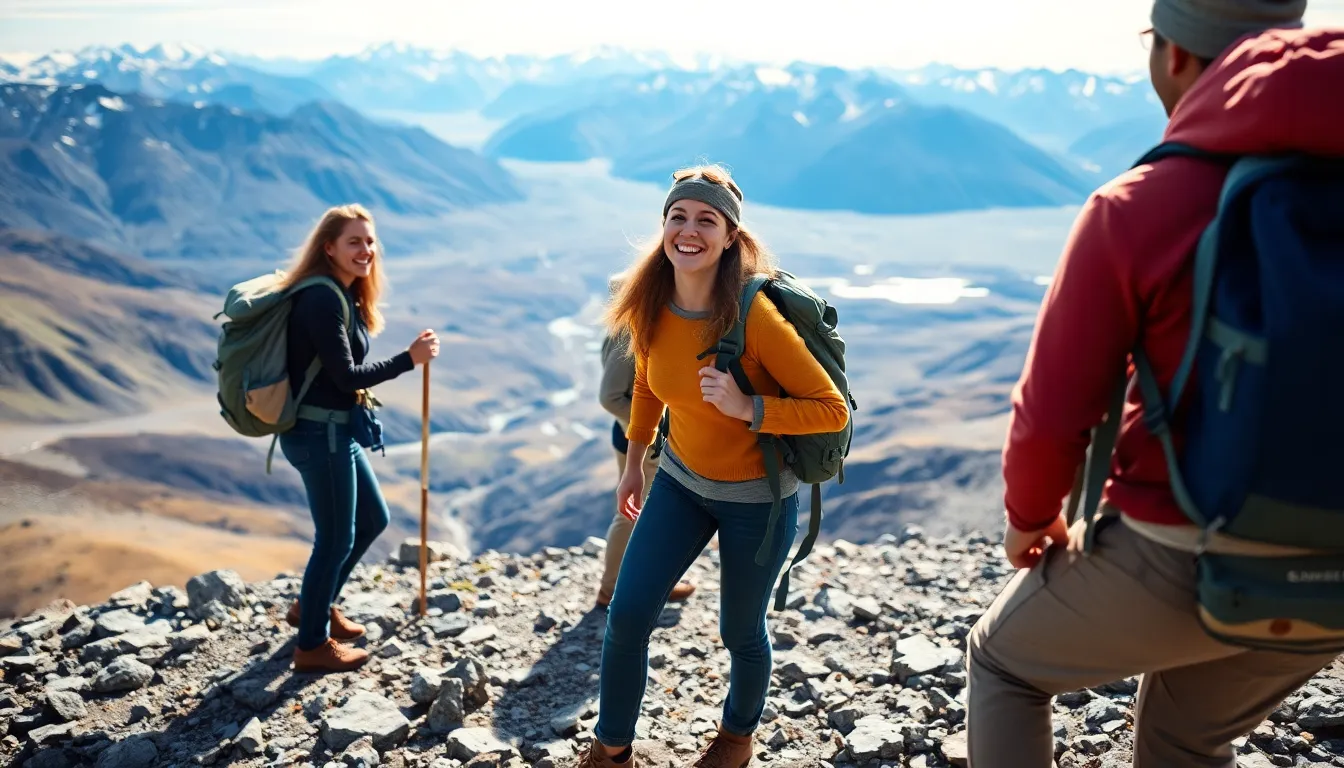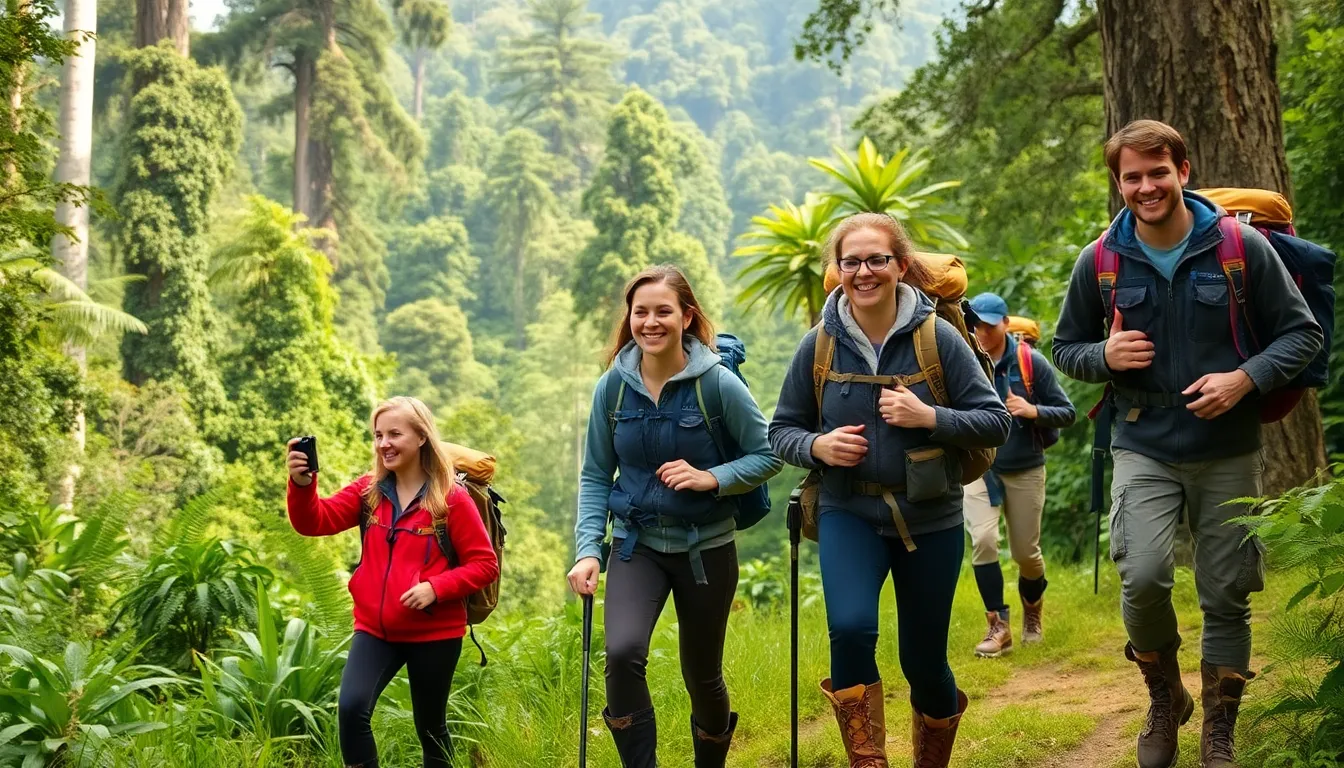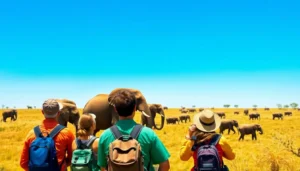Table of Contents
ToggleAdventure awaits those who dare to step off the beaten path. Expedition travel offers a thrilling escape from the mundane, whisking explorers away to remote corners of the globe where breathtaking landscapes and unique cultures collide. Imagine trekking through lush rainforests, scaling towering mountains, or navigating icy tundras—all while collecting stories that’ll make your friends both jealous and slightly concerned for your sanity.
Overview of Expedition Travel
Expedition travel encompasses adventurous journeys to remote and often unexplored regions. This form of travel caters to those seeking unique experiences away from conventional tourist paths. Through treks in stunning landscapes such as mountains and rainforests, travelers encounter the beauty of nature while engaging with diverse cultures.
Exploring these remote areas offers not just breathtaking views but also opportunities for personal growth and learning. Participating in local traditions and festivals enriches the travel experience, exposing adventurers to authentic cultural interactions. Trails wind through varying terrains, providing challenges that demand resilience and determination.
Various activities characterize expedition travel, including kayaking, mountaineering, and wildlife safaris. Kayaking through uncharted waters reveals hidden ecosystems, while mountaineering allows travelers to reach lofty summits. Wildlife safaris provide the chance to observe animals in their natural habitat, encouraging appreciation for biodiversity.
Tour companies specializing in expedition travel often focus on sustainable practices. They prioritize minimizing environmental impact and supporting local communities. Responsible tourism helps ensure that these stunning destinations remain pristine for future generations.
Participants in expedition travel frequently form lasting bonds. Shared experiences foster camaraderie among adventurers, creating friendships that can last a lifetime. Stories from these journeys contribute to a rich tapestry of human experience, illustrating the thrill of exploration and the quest for adventure.
Types of Expedition Travel

Expedition travel includes various types, each catering to different experiences and interests. Adventure seekers, culture enthusiasts, and wildlife lovers can all find unique opportunities within this exciting realm.
Adventure Expeditions
Adventure expeditions focus on high-energy activities and extreme environments. Travelers engage in mountain climbing, trekking through dense forests, or navigating challenging rivers. These adventures push physical limits while offering breathtaking views and heart-pounding moments. Many participants enjoy guided tours led by experienced experts, ensuring safety and maximizing the thrill. Challenging terrains and remote locations, such as the Himalayas or Patagonia, provide unforgettable experiences for those looking to test their endurance.
Cultural Expeditions
Cultural expeditions highlight authentic interactions with local communities and traditions. Travelers immerse themselves in varying cultural experiences, including cooking classes, traditional dances, or local festivals. Engaging with indigenous peoples allows adventurers to gain insights into different ways of life, fostering mutual respect and understanding. Locations such as the Amazon or Mongolia provide rich backdrops for cultural immersion, showcasing vibrant arts and traditions. Participants often develop a deeper appreciation for heritage and customs that shape the world’s diverse communities.
Wildlife Expeditions
Wildlife expeditions appeal to nature enthusiasts eager to observe animals in their natural habitats. These journeys often occur in national parks or reserves, where the focus remains on conservation and biodiversity. Travelers explore unique ecosystems, spotting species such as polar bears in the Arctic or orangutans in Borneo. Knowledgeable guides assist in ensuring responsible viewing practices, promoting wildlife preservation. Such expeditions educate individuals on the importance of protecting endangered species and their habitats while offering unforgettable encounters with the animal kingdom.
Planning Your Expedition
Planning an expedition involves careful consideration of various factors, ensuring an enriching adventure experience. Here are key components to focus on during the planning phase.
Choosing Your Destination
Selecting a destination requires assessing personal interests and activity preferences. Popular options include remote rainforests, towering mountains, and vast tundras. Researching climate conditions is essential, as weather impacts travel plans and activities. Local cultures add depth to the experience; consider destinations rich in history and tradition. Checking for necessary permits and documentation also ensures a hassle-free journey. Prioritizing safety by consulting travel advisories helps to mitigate risks associated with specific regions.
Preparing for the Journey
Preparation involves gathering essential gear and equipment suited for the expedition type. Packing lightweight, durable clothing ensures comfort during activities, while boots provide necessary support. Planning for nutrition with portable food options sustains energy levels throughout the trip. Physical fitness plays a crucial role, allowing for endurance during challenging activities. Researching local customs enhances cultural interactions and promotes respect for communities encountered. Understanding health risks and necessary vaccinations supports well-being during the journey.
Essential Gear for Expedition Travel
Packing essential gear ensures a successful expedition. Prioritizing functionality and comfort enhances the overall experience.
Clothing and Footwear
Layered clothing suits various climates and activities. Waterproof jackets protect against rain and wind during harsh conditions. Thermal base layers help regulate body temperature while trekking. Sturdy, moisture-wicking hiking pants provide durability and ease of movement. Footwear deserves attention as well; supportive hiking boots ensure safety on rugged terrain. A good pair of insulated socks keeps feet warm, minimizing discomfort for extended periods. Additionally, a wide-brimmed hat protects against sun exposure, while gloves offer warmth in colder environments. Explore local weather patterns to guarantee appropriate clothing choices.
Tools and Equipment
Essential tools and equipment facilitate smooth travel. A well-equipped backpack distributes weight and provides easy access to supplies. Navigation tools, such as compasses and GPS devices, aid in finding the correct paths. Multi-tools serve various functions, offering solutions to unexpected challenges. A portable first aid kit addresses minor injuries during adventures, ensuring safety along the way. Water purification systems offer clean drinking water, especially in remote locations. Binoculars enhance wildlife viewing, enriching the overall expedition experience. Researching expedition-specific tools guarantees preparedness for unique challenges.
Benefits of Expedition Travel
Expedition travel offers unique experiences that standard vacations cannot match. Travelers gain exposure to breathtaking landscapes while engaging with diverse cultures, fostering personal growth and a profound appreciation for nature. Adventure evokes a sense of excitement, pushing individuals beyond their comfort zones through activities like mountaineering and trekking.
Cultural immersion forms another significant benefit of this type of travel. Authentic interactions with local communities allow individuals to learn about traditions and lifestyles that differ from their own. Participants often partake in local rituals, enriching their understanding of global cultures.
Wildlife observation provides another compelling aspect of expedition travel. People witness animals in their natural habitats, enhancing awareness of biodiversity and conservation efforts. Responsible viewing practices promote ethical interactions with wildlife, safeguarding these environments for future generations.
Sustainable practices are integral to expedition travel. Tour companies prioritize minimizing environmental impact while supporting local economies. By choosing responsible operators, travelers contribute to preserving stunning destinations, ensuring the continued enjoyment of those areas.
Shared experiences create strong bonds among participants. Forming lasting friendships enhances the overall experience, adding emotional depth to the journey. Individuals often return home with not just memories but lasting connections with fellow explorers.
Careful preparation enhances the benefits of expedition travel. Researching destinations and understanding local cultures allows travelers to maximize their enrichment. Personal fitness and adequate gear selection ensure safety and comfort during challenging activities. Collectively, these elements contribute to an unforgettable travel experience.
Challenges of Expedition Travel
Expedition travel brings unique obstacles that adventurers must consider. Weather conditions can change unexpectedly, impacting safety and enjoyment. Navigating challenging terrains such as mountains, rivers, or forests often requires specialized skills and can lead to unexpected difficulties. Participants face physical demands, as many activities involve strenuous exertion that may exceed one’s usual capabilities.
Health risks also present significant challenges. Exposure to unfamiliar diseases makes vaccinations and preventive measures essential. Travelers must maintain awareness of altitude sickness, insect bites, and foodborne illnesses when exploring remote regions. Proper training and preparation help mitigate these risks.
Cultural differences complicate communication and interactions. Misunderstandings with local communities may arise due to language barriers or differing customs. Engaging respectfully in local traditions promotes a smoother integration into the travel experience. Additionally, navigating varying attitudes towards tourism and conservation can pose ethical challenges.
Logistical issues often arise in remote locations. Limited access to supplies and services requires careful planning. Ensuring adequate provisions like food, water, and equipment is crucial. Actual roads or paths may not exist, necessitating reliance on alternative transportation methods.
Environmental concerns also become prominent during expeditions. Travelers must practice sustainable tourism to minimize ecological impact. Striking a balance between adventure and preservation proves vital. Participants play an essential role in respecting wildlife habitats and natural resources by adhering to responsible practices.
Expedition travel promises adventure paired with inherent challenges. Overcoming these difficulties leads to enriched experiences, personal growth, and fulfilling memories.
Expedition travel opens doors to extraordinary adventures that go beyond the ordinary. It invites travelers to immerse themselves in breathtaking landscapes and diverse cultures while engaging in thrilling activities. The bonds formed during these journeys create lasting memories and friendships that enrich lives.
With a focus on sustainability and responsible tourism, expedition travel not only enhances personal growth but also fosters a deeper appreciation for the planet. By embracing the challenges and joys of exploration, adventurers embark on journeys that transform their perspectives and inspire future adventures.




